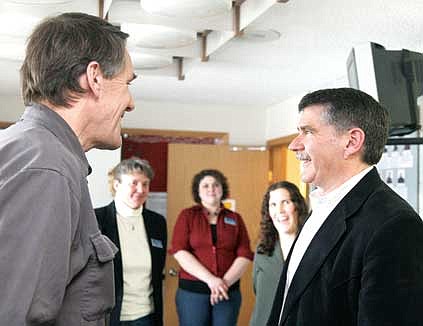Rehberg stops in Libby to visit CARD
Painting a picture of financial struggle to help victims of asbestos poisoning, the Center for Asbestos Related Disease met with Rep. Denny Rehberg (R-Mont.) Thursday afternoon in Libby.
The fourth-term Congressman gathered information about the center’s functions and issues and vowed to do his part to help.
“People need help and I really view it as my responsibility to come in from the House of Representatives side and see what I can do to elevate the issue in the minds of both my colleagues in Congress and the Obama administration.”
Rehberg sits on the House Appropriations Committee and that connection could help CARD continue its mission in the coming years. Local CARD officials obviously hope that will be the case.
“We struggle to keep the doors open and the lights on,” said Chris Johnson, a fifth-generation Libby native who works for the U.S. Forest Service and volunteers for the CARD board. “This is ground zero. This is where patients come … and this kind of health care is critical.”
CARD serves 2,600 patients across the county, including about 1,900 in 75 towns across Montana. Each month, the center sees an average of 20 new patients.
Dr. Brad Black, medical director, talked to Rehberg about various concerns surrounding the cleanup and summed up by saying, “it’s a matter of getting the job done completely.”
In addition, Black said health care for asbestos-related disease needs a long-term solution. He mentioned the continued possibility of the declaration of a public-health emergency – something aggressively advocated by Sen. Max Baucus.
Besides his assignment on the Appropriations Committee, Rehberg also serves as the No. 2 Republican on the Health and Human Services subcommittee.
“I hope to help them get inside the Health and Human Services budget because this is an ongoing issue,” Rehberg said. “It isn’t going to go away. It’s going to be here for an extended period of time.”
The congressman advised CARD that his office would work on the issue through his Deputy Chief of Staff Kristin Smith.
During the presentation to Rehberg, CARD listed its funding priorities as access to specialty health care, support for non-reimbursable services such as case management, psychosocial services, educational services and organization development, and a new or expanded facility.
“This is a health-care need that exists, you can’t hide from it,” Rehberg said.

